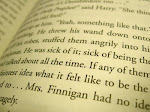
One of the first assignments in my Lit of Censorship class (and yes I'll reference this course a lot) was to write an essay about whether or not we, as American citizens, truly have freedom of speech. The First Amendment to the Constitution reads, as follows (courtesy of usconstitution.net):
Congress shall make no law respecting an establishment of religion, or prohibiting the free exercise thereof; or abridging the freedom of speech, or of the press; or the right of the people peaceably to assemble, and to petition the Government for a redress of grievances.
Fast forward to a couple of centuries later and we have groups trying to ban and censor books, various sedition acts within our history, censorship of news and TV shows, and the charge of a hate crime. Of these things, the last one is the only one I can somewhat agree with... yet still, it attempts to stifle the words and thoughts of certain people. With all of this to deal with, can we Americans really say we can speak freely in our own country?
True, we have it much better than plenty of other countries. At least we don't get arrested and beheaded on the spot when we speak ill of our government. But we do still have cases where people who speak their minds end up getting punished because of it.
Sometimes it's for good reason. After all, blind hatred, racism or prejudice is wrong, right? And anything that can incite certain people or groups deserves to be punished, right? Right, to an extent. Of course, the use of racial slurs or "hate speech" in literature gets a bit hazy. Is it used as a means of authenticity, so that characters that fit a certain time period seem more in tune with the setting? Or is it just a clever way to feed readers the author's own prejudiced and hurtful views? More often than not, I'd say it's the former. A book like Huckleberry Finn (which I'll talk about soon) uses the N-word as a means of having Mark Twain's writing sound authentic; it doesn't automatically mean Twain was a racist or that he was in favor of slavery. The same is true for so many other books dealing with the South or with racism. People need to read between the lines sometimes in order to get the truth.
I believe we truly don't have an unrestricted freedom of speech; after all, that would get plenty of people into trouble. We even censor ourselves from time to time because we know the consequences of our words. The way I think it works is this: our forefathers wrote that amendment into the Constitution likely treating it as a sort of honor system- meaning since we know we can say whatever we want, but doing that would bring about anger or chaos, we take it upon ourselves to decide what to say and what not to say. Or at least, we should- not to the point where everything we say HAS to be politically correct, but where there's a balance of tact and honesty. Make sense?
True freedom of speech can never be really possible, but at least we have something close to it. It's not perfect, but it's there, and we know we must exercise it with equal parts caution and humility. And of course, no matter what, we must fight to retain our free speech because that is what those before us intended.





No comments:
Post a Comment